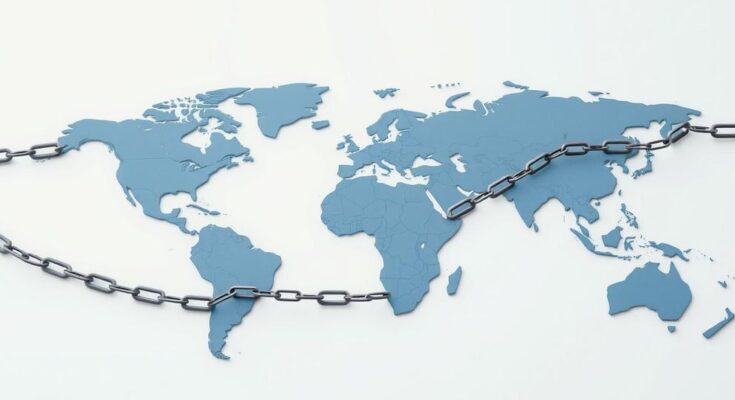Russia was exempt from President Trump’s recently announced tariffs due to existing sanctions limiting trade following its invasion of Ukraine. Critics argue this reflects Trump’s preference for a close relationship with Putin, raising questions about his commitment to U.S. allies. Future tariffs could still be imposed if talks with Russia do not progress.
Russia was notably exempt from the extensive tariffs announced by U.S. President Donald Trump, which affect nearly all countries. According to the White House, existing sanctions due to President Vladimir Putin’s invasion of Ukraine have significantly curtailed trade between the United States and Russia, rendering the tariffs unnecessary. Critics speculate that this omission indicates Trump’s preference for maintaining a favorable relationship with Putin over supporting U.S. allies.
Since the Biden administration implemented stringent sanctions against Russia in response to its aggressive actions in Ukraine, concerns have arisen regarding whether Trump might alleviate this pressure due to his past affiliations. Although Trump has suggested the possibility of future tariffs if Putin does not comply with U.S. desires for peace, Russia’s absence from the new tariff list revitalizes scrutiny over his firmness toward Moscow.
On the day of the announcement, Trump introduced a baseline of a 10% tariff on imports from 180 countries, with certain nations facing even harsher tariffs. Russian trade with the U.S. has plummeted over 90% post-sanctions, decreasing from $35 billion in 2021 to an estimated $3.5 billion in 2024. Also noteworthy is the omission of Canada and Mexico, previously subjected to a 25% tariff.
White House press secretary Karoline Leavitt indicated that sanctions currently in place preclude significant trade with Russia, yet the U.S. continues to engage in more trade with Russia than with countries like Mauritius or Brunei, which are included in the tariffs. Additionally, Ukraine, despite its ongoing conflict with Russia, also faces the imposed tariffs.
Criticism towards the exclusion of Russia from the tariff list has intensified. Notably, critics on social media have expressed dismay at this decision. For instance, the Lincoln Project remarked on X, previously Twitter, about Russia’s conspicuous absence in the tariff discussion. Prominent political figures have echoed these concerns, demanding explanations for such a notable exclusion.
In response to rising frustrations regarding Putin’s lack of cooperation in peace negotiations, Trump has threatened to impose substantial tariffs on Russia. A bipartisan group of 50 U.S. senators has also introduced a bill envisioning strict sanctions against Russia and its allies if peace talks do not proceed, potentially instituting tariffs of up to 500% on goods from countries purchasing Russian resources.
Experts consider such tariffs a significant escalation in U.S. policy towards Russia. However, clarity on the specific conditions under which such tariffs would be implemented remains elusive. Treasury Secretary Scott Bessent confirmed that the U.S. does not engage in trade with Russia due to existing sanctions.
A cautionary note has been issued by U.S. officials against retaliatory measures by countries that face tariffs, emphasizing the risk of escalation. With legislative moves proposing steep tariffs on vital Russian exports like oil and gas, the question remains whether Moscow will ultimately evade Trump’s tariffs.
In summary, while Russia has been excluded from recent tariff announcements made by President Trump, the rationale stems from pre-existing sanctions limiting trade between the two nations. This decision has spurred criticism regarding Trump’s alignment with Putin over U.S. interests. As tensions surrounding the Ukraine conflict persist, the future enforcement of tariffs against Russia remains uncertain, particularly with mounting legislative pressures aiming for more stringent sanctions.
Original Source: www.newsweek.com




